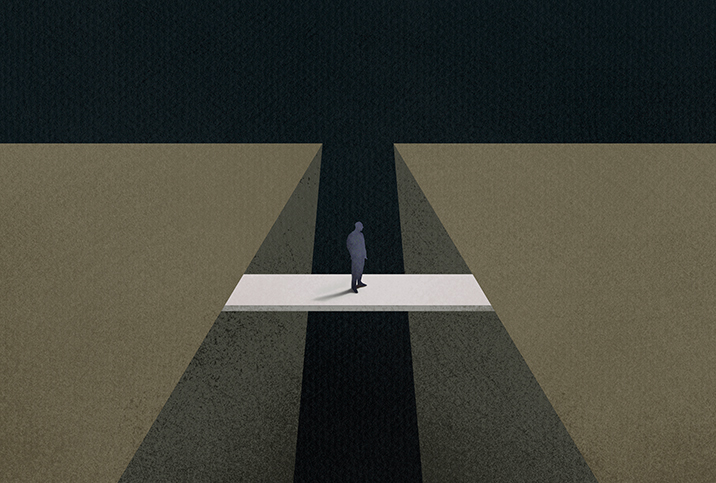Treat Erectile Dysfunction and Enjoy Relationship Benefits Beyond Sex

Getting your penis erect and firm after struggling with erectile dysfunction (ED) comes with a host of benefits, namely, the ability to enjoy pleasurable, passionate sex again. Beyond the recovery of functional erections and the much-anticipated sex their maintenance enables, however, being able to successfully treat erectile dysfunction can also be a boon to romantic relationships.
"Because men can feel ashamed when they have ED, successful treatment can cause men's relationships to improve," said Danielle Harel, Ph.D., M.S.W., the co-founder of the Somatica Institute, an educational hub for experiential sex coaching based in San Francisco, in an email. "This is largely because shame causes people to hide away and disconnect for fear of being ridiculed or left. When a man feels confident in his body's functionality, he is likely to be much more present in intimacy."
Since treating ED restores a precious form of penile functionality that can boost a guy's confidence, the outcomes and dynamics of intimate relationships are also poised to improve.
Finding a sustainable way to treat and manage ED can lead to long-term positive outcomes and ongoing relationship happiness. For a lot of men, a wearable device proves helpful. Eddie® is an FDA-registered Class II medical device designed to treat erectile dysfunction and improve male sexual performance. In 2021 clinical trials, Eddie proved effective in treating men with physically, psychologically and pharmacologically induced ED. Of the study participants, 95 percent of men who used Eddie reported a beneficial effect on their sex lives.
A holistic approach to relationships
"One of the sad side effects of ED is that men put so much pressure on everything being about their dysfunction—and their partners may also do this—that they end up not dealing with other issues that are present in the relationship," Harel said. "Relationships are likely to improve the most when looked at holistically instead of just focusing on a single issue."
Putting an end to ED can help partners move past a paralyzing focus on sexual complications, which can impact other facets of a relationship. The communicative work that often goes into therapeutic treatments for ED is helpful in that regard.
Rossana Sida, Psy.D., L.M.F.T., a sex and relationship therapist based in Los Angeles, explained in an email that she works with clients to come up with a few explanations for why they might be having erection-related difficulties, as well as the avenues they can explore to resolve the relevant issues. The plan is then shared with the client's partner.
"The communication is practiced in session so as to not reveal more than the client is ready to while also being honest about what is happening within him," Sida said. "After these conversations, partners immediately begin to feel some relief that what is going on is not an issue about them but something within the client. Once partners feel this relief, it is easier for them to become supportive, considerate and compassionate in the bedroom."
Transcending cycles of guilt and shame
Robert Mendelsohn, a licensed marriage and family therapist and the assistant clinical director at the Center for Healthy Sex in Los Angeles, said in heterosexual relationships in particular, a woman often feels "less than" when a partner goes through periods of ED. She fears she's not attractive enough or worries her partner just isn't that into her, for example.
"And then that creates a whole sort of chain of secondary reactions, where the man feels bad that the woman feels bad, and everybody feels bad," he said. "So it can really assist in the relationship to sort of sort all that out."
Mendelsohn said involving the partner and communicating with them so they understand the ED isn't a result of some failure on their part can remove impediments to the restoration of erectile function while enhancing the relationship on multiple levels.
"The removal of those things just really creates a new level of trust in the relationship and [promotes the] ability to restore fun and playfulness to sexuality, which is such an important part of it," he said.
When someone feels shame associated with a problem, they're likely to delay seeking treatment for something they regard as shameful. Once someone does seek help, however, it can feel like a weight is being lifted off their shoulders, as well as the shoulders of their partner.
"After years or even decades of struggling with erectile dysfunction, partners become incredibly hopeful for sex therapy to help as it has been a long time coming," Sida said. "With that hope comes motivation and energy to assist with the erectile difficulties in any way they can."
The process is presumably liberating for partners who blame themselves when a lover is unable to achieve or maintain an erection.
"As a society, we expect men to be the initiators of sex, the ones who always want it, are motivated by it and who are highly visual, so when we are faced with a man having difficulty in the bedroom, it is thought about in the superficial instead of digging deeper into their mindset," Sida explained.
In an email message, Shannon Chavez, Psy.D., a sex therapist and clinical psychologist with a practice in Beverly Hills, California, said "sex is a partnered issue" wherein each participant has a role, and many partners are eager to support each other so both individuals feel comfortable and empowered during sex.
"It also shows a commitment to sexual intimacy in the relationship, which partners not only support but agree to engage in the treatment process," Chavez said.
Robust erotic and sexual pleasure
Mendelsohn said he and other therapists often prescribe clients ED exercises that facilitate the restoration of the fun and playful facets of sexuality.
"We'll involve the partner first in having conversations; just have a conversation together about what turns you on, about what type of touch you like," he said. "We use a really good book called 'Coping With Erectile Dysfunction,' by Michael Metz and Barry McCarthy. We use this book a lot."
The book describes five different kinds of touch apropos to the treatment of ED. Mendelsohn asks couples to talk to each other to see what they like more of and what they like less of:
- Affectionate touch
- Sensual touch
- Playful touch
- Erotic touch
- Intercourse-related touch
"You often find that couples learn things about each other that they never knew," Mendelsohn said. "So this is part of the communication element, to take the pressure off, to take the performance aspect out of it and just to make it a playful exploration of each other and what each other [likes]. Because often there are many unknowns there. Sometimes couples are together many years and there's still a lot they don't know about what each of them like sexually, what turns them on."
Sida said she often asks her clients to identify what works for them sexually and otherwise.
"After the partner is already understanding of the therapeutic plan and, therefore, is feeling hopeful and supportive, the client has another conversation where they tell their partner what would help and they talk about what works for them as a couple in order to make those accommodations happen," she said. "Some common examples of sexual and nonsexual things that work to encourage the maintenance of an erection are oral sex, touching in specific places, allowing for foreplay, not talking about work, morning sex, having the room clean, etcetera."
In the end, sex plays an important part of most relationships, so it's equally important to remember there are a variety of ED treatments available to help maintain that critical intimacy — including wearable devices like Eddie.
What's more, the activities and simple behavior modifications mentioned above might just help partners do more than treat erectile dysfunction; they might help them to better satisfy each other psychoemotionally as well as sexually.




















